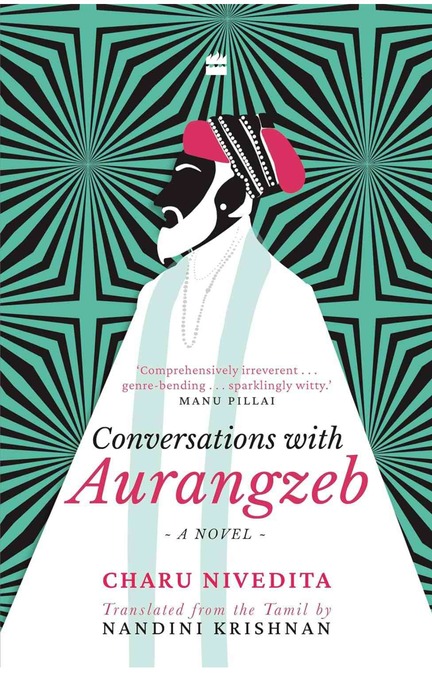It took several nights and a few markers to finish this book. Generally, it is difficult to hijack a person’s mind when it is already hijacked. However, the author slices through effortlessly and conquers your mind by having a conversation with Aurangzeb, sorry with the spirit of Aurangzeb. A particular chapter urged me to write about the nuances of this masterpiece. In the chapter when Aurangzeb talks about his daughter, like in the middle of a storm, the breezy poetic narrative caresses the soul of the reader. By the way, this work doesn’t gradually develop; it just takes you off, just like that. Many times, if you have read Charu Nivedita’s writings before, you will be confused or amused peering at the spirit of Aurangzeb because you will definitely see Charu’s spirit in Aurangzeb’s voice, a solid work of brilliance. Blasphemy, politics, music, and history—everything grounded in a blender—served you with the needed layers of decor.
When the spirit considers some of the big names as bozos, I feel so kicked in my sternum, but the spirit has specific points, which I would call rational persuasion. At the same time, there is no controversy at all; even though Charu and the spirit become sceptical about a few topics they discuss, it is a clean, unbiased historical exemplar. “Idiotic fad like democracy” or “we are happy with the illusion”: These sentences just slide through the story, touching on the inevitably pungent truth. The stories within the story and the relevant references just weave the history with the present, and bang, you will realise that the history and the present aren’t really different. Just like how we realise that the states of the heroes and the villains are written over and over again in specifically different colours. The entire book defies the notion of how humans think about themselves and the species as such. For instance, I find several organisations use personality tests, and youngsters identify their own personality type with a few online tests. However, in real, you could find different traits in yourself based on different contexts. The author of this novel had unapologetically explored the dynamic personality rainbow in Aurangzeb’s trait. Rainbow is just a figure of speech here; he is not confused, I think, to the best of my knowledge. Aurangzeb is narcissistic, clear, and strategic. Again, narcissism, unlike what we think of, is not all together an undesirable trait. Sometimes, narcissism emerges spontaneously or develops naturally. Chapter by chapter, you will see a different personality intertwined with history and traditions. When I said traditions, there is a particular
instance where the spirit describes a woman being carried to perform sati. This insanely provocative and threatening incident is the epitome of how writing can hit you hard. No glossy words, and no political correctness. The writing just makes you transcend the place; you will be just there. You could feel the heat of unforgiving flames and smell the burnt corpse. This was the second time I could feel this deathly atmosphere after reading the book “Things Fall Apart.” It is a book that depicts the life of Okonkwo and their journey during the colonisation era. Things Fall Apart was suggested by my students (I take my students’ book recommendations seriously).
However, when you believe and start to nod to the Aurangzeb spirit’s argument again and again, the writer comes out and breaks the worship then and there by making the spirit mortal and flawed. Take a bow for not making the readers stick to the worship of the character but to understand the greyest matters in specific details. One of my favourite lines is, “It is not actions but appearances—forgive the pun—that strike a chord with people.” Brilliant! Sometimes, charisma becomes toxic not only because the leaders take advantage of it but also because the commoners willingly submit themselves to charisma. In a world where people call for networking, network exposure, weak ties, and strong ties and assume that networking is your net worth, we cannot deny the power of appearances. At the same time, we have to be cautious about the conversion of appearances into actions. Talk is cheap; action is both difficult and exhaustive. It is high time we also make note of actions beyond appearances. As sharp as a knife, this book illustrates the bitterness behind the power of appearances.
The author puts you and your opinions in a washing machine, and you will find yourself in a quandary. One such quandary may happen when the spirit compares himself with Karl Marx. With Karl Marx!
The book uses such simple language as if you were reading a book like Animal Farm but is far more conceptual and treats the complicated history with respect. Comparisons with Krishna, Hitler’s concentration camps, and Che’s downfall: the encapsulation of the world’s notorious people and events will keep you engaged and involved. Engagement and involvement are different. My students look for engagement, and I expect involvement; therefore, we both struggle to find peace in the classroom and try our level best not to kill each other! See?
Again, coming back to Aurangzeb, a spectacular narration of why Aurangzeb chose the title “The Man Who Jailed His Own Father” will keep you buried in the book, as racy as any other internationally acclaimed fiction.
And beyond history, culture, and other things, the book is constantly dotted with pure managerial concepts like Machiavellianism and utilitarian principles. Sometimes, I feel like Steve Jobs has taken over Aurangzeb’s position!
Disclaimer: All Opinions on the post are personal.
